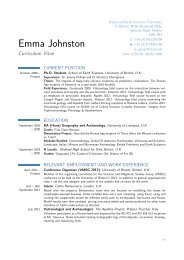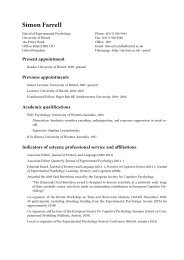What is Scientific Progress?
What is Scientific Progress?
What is Scientific Progress?
You also want an ePaper? Increase the reach of your titles
YUMPU automatically turns print PDFs into web optimized ePapers that Google loves.
knowledge nonetheless. Popper was right to think that falsification even on its own can contribute<br />
to scientific progress. Furthermore, some suitable approximate and restricted version of a false<br />
theory might well be true and knowable. We might be impressed by the falsification of Newton’s<br />
theories concerning gravity by the precession of the perihelion of Mercury. We might<br />
pessim<strong>is</strong>tically fear a similar fate for their Einsteinian successors. Yet that <strong>is</strong> compatible with<br />
knowledge that Newton’s laws provide a good approximation for middle-sized dry goods travelling<br />
at moderate speeds within the Solar System and not too near the Sun, and also compatible with<br />
knowledge that general relativity <strong>is</strong> an even better approximation for these things (and a good<br />
approximation for some other things and circumstances besides). When faced with a successful but<br />
false theory an obvious research project <strong>is</strong> to find an improved theory. Another reasonable research<br />
project <strong>is</strong> to find the limits and margins for error within which the old theory holds true.<br />
In conclusion, the pessim<strong>is</strong>tic induction seems a poor inference; there <strong>is</strong> no reason to suppose that it<br />
rules out the accumulation of scientific knowledge.<br />
4.2 The functional-internal<strong>is</strong>t conception of progress and transcendent truth<br />
Kuhn also accepts the pessim<strong>is</strong>tic induction, but makes more of the alleged transcendence of truth. 14<br />
In the first edition of The Structure of <strong>Scientific</strong> Revolutions Kuhn’s stance <strong>is</strong> a neutral<strong>is</strong>t one<br />
concerning the truth of theories and our knowledge of them. One of h<strong>is</strong> targets in that book <strong>is</strong> a<br />
Whigg<strong>is</strong>h approach to the h<strong>is</strong>tory of science, whose explanation of the success of past theories <strong>is</strong><br />
coloured by our current belief in the truth of those theories. Kuhn’s aim <strong>is</strong> to build a theoretical<br />
framework that will permit the explanation of developments in scientific beliefs solely in terms of<br />
information available to the agents concerned (primarily information concerning the success of<br />
27






